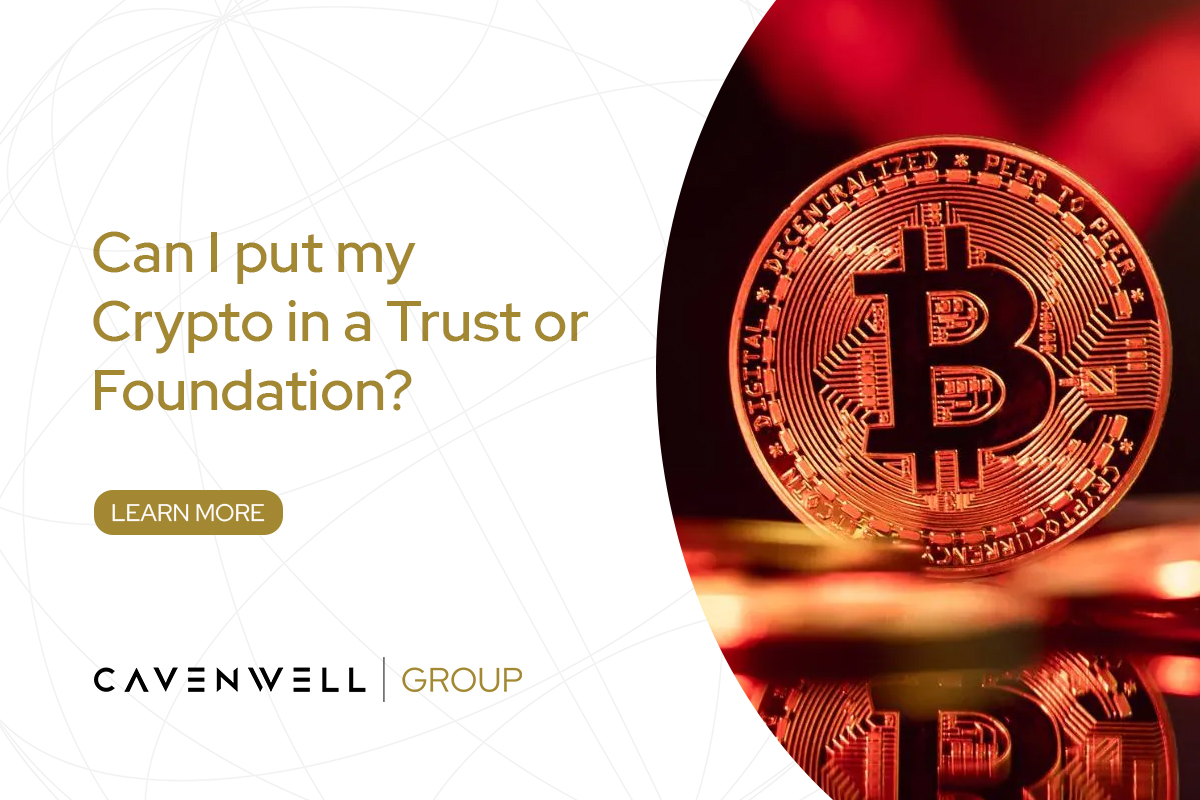Introduction
As crypto wealth continues to scale to unprecedented levels, a once niche question is now a critical one: Can I put my crypto in a trust or foundation? The short answer is yes, but only if you’re working with the right experts. At Cavenwell, we’ve built a global reputation for our expertise in structuring digital asset wealth.
We were one of the first trust and company service providers in the world to specialize in digital assets. From helping private clients protect family wealth to designing the corporate structure behind some of the top 100 tokens and businesses in the Web3 ecosystem, we’ve spent years deep in the trenches of crypto structuring. Our team includes experts who’ve not only worked with digital assets from day one but also supported regulators to understand and evaluate them.
Despite crypto’s decentralized ethos, every successful investor, founder, or protocol contributor eventually faces the same very centralized realities: succession, compliance, litigation risk, and the simple danger of losing access. Without the right legal structure, even the most secure cold wallet can become a locked vault with no key, especially in the event of incapacity, death, or a regulatory dispute.
This article cuts through the confusion and misinformation surrounding digital asset ownership and outlines how trusts and foundations, when designed properly, can be powerful tools for crypto asset protection, estate planning, and wealth continuity.
Why crypto needs legal structures
The crypto ecosystem wasn’t built for legacy legal systems. But ironically, it needs them now more than ever. As digital assets evolve from speculative holdings to multi-generational wealth, the absence of proper legal structures can expose investors, founders, and even entire protocols to unnecessary risk. And it’s not just about security. It’s about continuity, control, and credibility.
Growing crypto wealth means growing exposure
Crypto has minted billionaires and seeded generational wealth in a span of years, not decades. But the very traits that make it revolutionary, it’s decentralization, pseudo-anonymity and self-custody also make it uniquely fragile. Unlike traditional assets, there’s no private banker to call if you lose access. For high-net-worth individuals and crypto-native businesses, this creates a critical vulnerability.
Executives and founders in the space carry outsized exposure. Many hold large token allocations in projects they helped create. These holdings often represent not just value but also influence. That makes them targets for litigation, regulatory scrutiny, or hostile claims. Without appropriate legal structuring, personal and project assets can be indistinguishable, and all are potentially exposed.
Placing assets into legally recognized trusts or foundations allows individuals to separate and protect wealth from personal liabilities, reduce the risk of unwanted control, and prepare their holdings for seamless succession.
Preventable nightmares: Lost keys, locked wallets, and no succession plan
The crypto space is filled with cautionary tales. Wallets lost forever due to forgotten seed phrases. Families unable to access assets after a loved one’s passing. The possibility that entire estates are contested in court because no one knew who held the keys.
Legal structures act as a contingency plan. They allow founders and investors to define access controls, asset distribution, and contingency measures if they’re not around to manage it. For example, a properly designed foundation can include governance rules that mirror the flexibility of smart contracts, but with legal enforceability.
Structures also provide compliance and legitimacy. As global jurisdictions increase scrutiny of digital assets, trusts and foundations create a framework for transparent ownership. They support regulatory declarations, tax planning, and legal control that wallets or exchanges alone simply can’t offer.
What is a Trust? What is a Foundation?
When people think about holding wealth, they often think of bank accounts or investment portfolios held in personal names, but for long-term protection and liability shielding, the most effective tools are often trusts and foundations.
Trusts and Foundations made simple
A trust is a legal arrangement where one party (the settlor) transfers assets to another party (the trustee) to manage on behalf of beneficiaries. Trusts offer privacy, flexibility, and have been around for centuries. However, they come with strict duties for trustees, who must act independently and prudently. This becomes tricky when volatile or self-custodied assets like crypto are involved.
A foundation, on the other hand, is an incorporated legal entity with its own identity. It’s governed by a council and bylaws rather than a trustee. Foundations have no owners, only a purpose and beneficiaries. This gives them a unique advantage for crypto holders. They offer greater flexibility and clarity, especially when managing access to wallets and defining control structures whilst leveraging the same concepts of asset protection and succession planning afforded by trusts.
Why Foundations often make more sense for crypto
Trustees are generally legally bound to avoid high-risk assets, making crypto a tough fit. Foundations, however, are more adaptable. They allow the founder to retain involvement without breaching the legal construct. They also make it easier to define wallet access and use governance frameworks to support decisions.
At Cavenwell, we offer both structures. But in most crypto-native cases, we lean toward foundations due to the practical and legal flexibility they provide for this asset class.
Can you legally hold crypto in a Trust or Foundation?
Yes, you absolutely can. But there’s a catch, not every provider allows it, and not every jurisdiction supports it in practice. Crypto can legally be held within these structures, but only when the right expertise is involved.
Why it’s not straightforward
Trusts and foundations involve the transfer of legal ownership. With traditional assets, this is simple. But with crypto, complications arise. Who holds the private keys? How is control proven or transferred? If the settlor retains access to a hardware wallet, does that void the transfer?
Also, there’s no one-size-fits-all crypto asset. Liquid tokens like ETH or BTC require different structuring approaches and considerations than things like token warrants, SAFTs, or complex DeFi positions. Each type of crypto asset has its own legal and compliance challenges from title and custody to valuation and taxation.
Cavenwell’s pioneering approach
Cavenwell has addressed these challenges head-on. We’ve built practical solutions that allow us to legally and compliantly accept crypto into trusts and foundations. This includes working with legal counsel to insert custom clauses into trust deeds and foundation bylaws, defining digital asset handling, custody responsibilities, and governance protocols.
We’ve also established asset acceptance criteria, so clients know exactly which types of crypto we can hold in which structures. This provides clarity from day one, reducing uncertainty, and most importantly, reducing risk for all parties involved.
Why most Trustees say no (and why we say yes)
Traditional fiduciary providers are notoriously conservative. Most say no to crypto not because it’s impossible, but because it’s unfamiliar and seems too risky. But that doesn’t mean it’s unworkable.
The Trust industry’s caution
Many trustees worry about the volatility of crypto. Others are concerned about their legal responsibilities. A volatile token might be classified as a “wasting asset,” which may breach fiduciary duties if not managed properly. Add to that custody risks, lack of technical expertise, and regulatory grey zones, and the default response becomes “no.”
But that blanket refusal often ignores reality. Digital assets are here, and they need structure. Avoiding them doesn’t protect anyone, in fact it generally leaves clients exposed.
Why Cavenwell says yes
At Cavenwell, we don’t just say yes, we understand why others say no, and we’ve built the capabilities to move beyond that. With deep, proven experience across the full spectrum of the digital asset economy, we’ve worked with clients ranging from early crypto adopters and protocol founders to token issuers, institutional investors, and Web3-native businesses.
We get it. How digital assets work, what regulators expect, and where legacy systems struggle. That insight comes not from theory, but from years of hands-on work at the forefront of the space. Our team has developed internal standards, digital asset risk frameworks, and legal drafting precedents designed specifically for crypto inclusion within trusts and foundations.
We’ve structured solutions for clients holding everything from BTC and ETH to token warrants, NFTs, staking assets, and DAO treasury allocations. We maintain active relationships with leading custody providers and understand the compliance and operational nuances of major exchanges, DeFi protocols, and custody technologies.
More importantly, we take a collaborative approach. We don’t give you a list of what’s not possible, we work with you to understand your assets and your goals, then build the structure that aligns with both.
Trust vs Foundation: Which is better for holding digital assets?
There’s no universal answer. Both structures are valuable. But for many crypto scenarios, we find that a foundation offers more flexibility and legal comfort.
Key Comparisons
| Feature | Trust | Foundation |
| Legal Form | Private legal arrangement | Separate legal entity |
| Governance | Trustee with fiduciary duties | Council members with rules (bylaws) |
| Asset Transfer | Settlor must give up control | Can retain some access if properly governed |
| Crypto Compatibility | Difficult with cold wallets | Easier with defined governance |
If you want to retain a role in asset management, a foundation is often more practical. If your needs are more traditional and long-term, a trust may still work. We help clients weigh these options based on their asset mix, goals, and risk profile.
Jurisdiction matters: DIFC, ADGM, and Jersey
Not all jurisdictions are created equal, especially when it comes to digital assets. Some have embraced innovation with clear legal pathways, while others remain cautious or outdated. At Cavenwell, we take a jurisdictionally agnostic approach, supporting clients with structures in the jurisdictions that best align with their goals, risk profile, and asset mix.
Supporting the right structure in the right place
While we can support structures in most major international financial centers, certain jurisdictions have become core to our offering because of their regulatory clarity, digital asset readiness, and global reputation. These are the ones where we’ve gone further and established our own offices, building deep local capabilities.
The UAE, in particular, leads the way with DIFC (Dubai International Financial Centre) and ADGM (Abu Dhabi Global Market), two common law financial free zones with purpose-built laws for foundations and forward-thinking views on digital assets. These centers offer international credibility with modern legal infrastructure and are increasingly home to crypto founders, investors, and projects.
Jersey, too, stands out for its longstanding strength in private wealth and its proactive stance on digital assets. With decades of trust law development and regulator familiarity with crypto structures, Jersey provides a mature, stable environment for asset protection and estate planning.
How we help clients hold crypto in legal structures
At Cavenwell, we take a personalized and collaborative approach. We start by understanding what you hold, how you hold it, and what you’re trying to achieve. From there, we architect the structure that brings clarity, protection, and legal continuity.
A digital-first structuring experience
Here’s what working with us looks like:
- We map your digital asset holdings and planned exposures.
- We work with you and your advisors to identify the right jurisdiction, structure, and governance model.
- We support your advisors with their drafting of trust deeds and foundation bylaws to include our standard clauses for crypto assets.
- We coordinate custody, whether self-custody, institutional storage, or hybrid control.
- We use blockchain analytics and screening tools to meet compliance requirements.
- We support your structure with ongoing digital-native administration.
We’re your crypto-native structuring partner. Our Cavenwell 3.0 division combines deep roots in the Web3 space. We’ve helped some of the world’s most prominent projects, token teams, and investors protect their digital wealth using legal infrastructure that’s robust, flexible, and future-ready.
Conclusion: Turn crypto from risk to resilience
Crypto is borderless, revolutionary, and volatile. But your legal structure doesn’t have to be. Whether you’re building a protocol, investing across chains, or protecting family wealth, you need more than a cold wallet, you need a plan.
At Cavenwell, we blend fiduciary experience with digital-native insight. We’ve created the back-end for some of the world’s leading Web3 initiatives, and we bring that same care to individuals and families who want to protect their digital wealth for generations to come.
Talk to a crypto-trust specialist at Cavenwell today and secure your digital future with confidence.
FAQs
Do I need to declare my crypto to put it in a trust or foundation?
Yes, full disclosure is essential in order to effect the transfer into the structure. Additionally, professional tax advice should be obtained to ensure the structure is fully compliant and any tax disclosures or filings are made.
What kinds of tokens can be held?
We support a wide range, from liquid tokens like Bitcoin and Ethereum to NFTs, token warrants, DeFi positions, and structured crypto products.
Can I retain some control over my assets?
Depending on the structure and jurisdiction, yes, however legal and tax advice must be sought. Foundations often allow more involvement through council member roles or defined roles in governance documents.
What if I have NFTs or complex DeFi holdings?
We’ve structured entities around NFT collections, staking positions, DAO treasuries, and more. Each case is reviewed based on risk, custody, and legal fit.
Can I use a trust or foundation for my startup’s token allocation?
Absolutely. We work with founders to place project tokens or team allocations into appropriate structures for vesting, governance, and assurance.
What happens if I die or become incapacitated?
That’s one of the primary reasons to structure your holdings. Trusts and foundations allow you to define what happens next, who gets access, under what conditions, and with what oversight.
The content of this article is intended to provide a general guide to the subject matter. Specialist advice should be sought about your specific circumstances.
While these documents are accurate as of the date of issue, they may be subject to change in the future.


